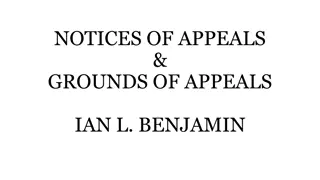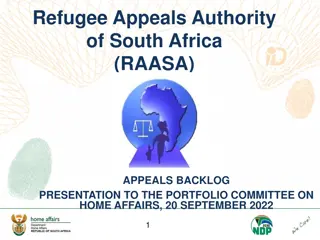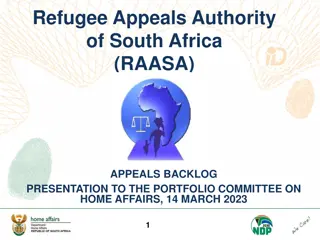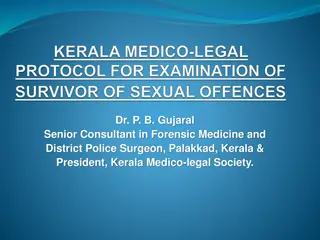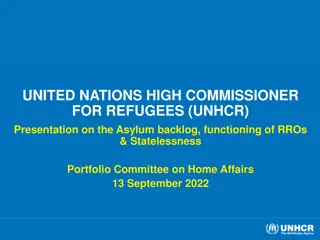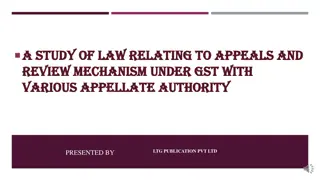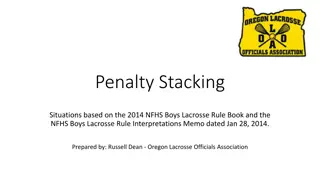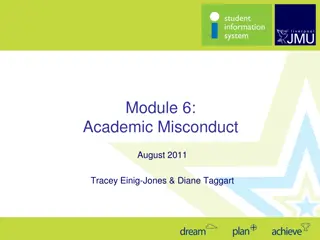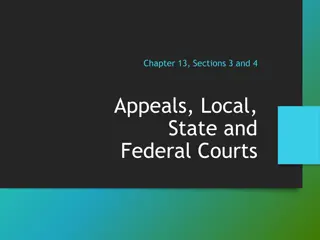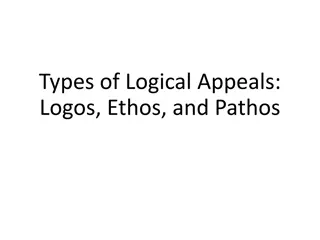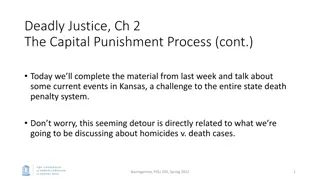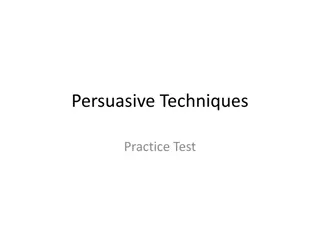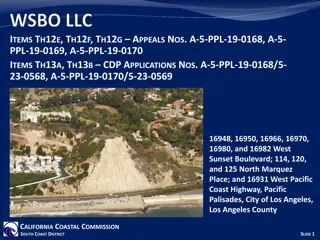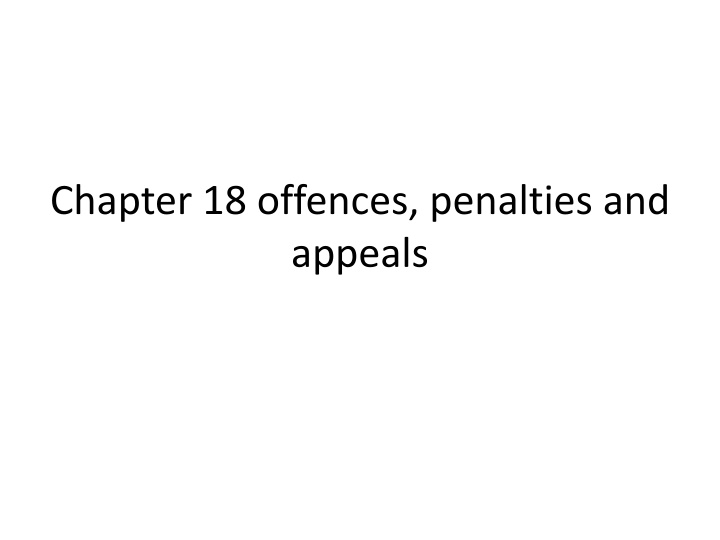
Offences, Penalties, and Appeals in GST Law
Explore the meaning of offences, the difference between cognizable and non-cognizable offences, nature of penalties, and general disciplines related to penalties under GST law. Learn about the significance and consequences of breaching provisions in the GST Act.
Download Presentation

Please find below an Image/Link to download the presentation.
The content on the website is provided AS IS for your information and personal use only. It may not be sold, licensed, or shared on other websites without obtaining consent from the author. If you encounter any issues during the download, it is possible that the publisher has removed the file from their server.
You are allowed to download the files provided on this website for personal or commercial use, subject to the condition that they are used lawfully. All files are the property of their respective owners.
The content on the website is provided AS IS for your information and personal use only. It may not be sold, licensed, or shared on other websites without obtaining consent from the author.
E N D
Presentation Transcript
Meaning of offence An illegal act or crime. An act or series of acts which is made punishable under the act. Therefore, when the provisions of the act are not followed, it is an offence. An offence is a breach of a law or rule, i.e., an illegal act. Similarly, an offence under GST is a breach of the provisions of GST Act and GST Rules. 1. Cognizable offences (i) Meaning :- a police officer has authority to make an arrest without a warrant, in respect of cognizable offences. However, GST being a special legislation, only the officers, duly empowered under the act can act as above.
(ii) Offences covered :- foll. Offences, where amount of tax evaded or input tax credit wrongly availed or utilised or refund wrongly taken more than 5 crores, namely: a) Supply of any goods or services or both without issue of any invoice, in violation of the provisions of this act or the rules made there under, with the intention to evade tax; b) Issue of any invoice or bill without supply of goods or services or both in violation of the provisions of this act, or the rules made there under leading to wrongful availment or utilisation of ITC or refund of tax; c) Avails ITC using such invoice or bill referred to in clause (b); d) Collects any amount as tax but fails to pay the same to the govt. Beyond a period of 3 months from the date on which such payment becomes due;
(iii) Nature :- non bail able (iv) Category :- serious offences 2. Non-Cognizable offence:- the police officer does not have the authority to arrest without warrant. Under GST also, the officer does not have similar power. Offences covered:- all offences specified under sec. 132 except the offences that are cognizable and non-bail able offence. Nature:- bail able Category:- relatively less serious offences.
Meaning of penalty The word penalty is not specifically defined in GST and so it takes the meaning from various judicial pronouncements and principles of jurisprudence. A penalty is a punishment imposed by law for committing an offence or failing to do something that was the duty of a party to do. A penalty can be both corporal (jail) and pecuniary (monetary) penalties are applicable under GST.
General disciplines related to penalty 1. No penalty shall be imposed by officer under the act for the foll. a) a breach shall be considered a minor breach if the amount of tax involved is less than 5,000. b) an omission or mistake in documentation which is easily rectifiable and made without fraudulent intent or gross negligence. 2. The penalty imposed under this Act shall depend on the facts and circumstances of each case and shall be commensurate with the degree and severity of the breach.
3. No penalty shall be imposed on any person without giving him an opportunity of being heard. 4. The officer under this Act shall while imposing penalty in an order for a breach of any law, regulation or procedural requirement, specify the nature of the breach and the applicable law, regulation or procedure under which the amount of penalty for the breach has been specified. 5. When a person voluntarily discloses to an officer under this Act the circumstances of a breach of the tax law, regulation or procedural requirement prior to the discovery of the breach by the officer under this Act, the proper officer may consider this fact as a mitigating factor when quantifying a penalty for that person. 6. The provisions of this section shall not apply in such cases where the penalty specified under this Act is either a fixed sum or expressed as a fixed percentage.
Penalty for offences as per sec. 122 S.No OFFENCE PENALTY 1 Any of the 21 types of offences prescribed. 10,000 or amount of tax involved whichever is higher 2 Any registered person a. Who supplies any goods or services or both on which any tax has not been paid or short-paid or erroneously refunded, or b. Where the ITC has been wrongly availed or utilised,- Case I for reason of fraud or any wilful misstatement or suppression of facts to evade tax Case II for other than case I reasons 10,000 or tax due whichever is higher 10,000 or 10% of tax due whichever is higher 3 Where the person is not directly involved in any evasion but may be a party to evasion or if he does not attend summons or produce documents. May extend to 25,000
List of offences given under sec.122(1) 1) Making a supply without invoice or with false/ incorrect invoice; 2) Issuing an invoice without making supply; 3) Not paying tax collected for a period exceeding three months; 4) Not paying tax collected in contravention of the MGL to the credit of the Govt. for a period exceeding 3 months from the due date; 5) Non deduction or lower deduction of tax deducted at source or not depositing tax deducted at source under section 37; 6) Non collection or lower collection of or non payment of tax collectible at source under section 43C; 7) Availing/utilizing input tax credit without actual receipt of goods and/or services; 8) obtaining any refund; 9) Availing/distributing input tax credit by an Input Service Distributor in violation of Section 17 or relevant rules;
10) Furnishing false information or falsification of financial records or furnishing of fake accounts/ documents with intent to evade payment of tax; 11) Failure to register despite being liable to be registered; 12) Furnishing false information regarding mandatory fields for registration; 13) Obstructing or preventing any official in discharge of his duty; 14) Transporting goods without prescribed documents; 15) Suppressing turnover leading to tax evasion; 16) Failure to maintain accounts/documents in the manner specified in the Act or failure to retain accounts/documents for the period specified in the Act;
17) Failure to furnish information/documents required by an officer in terms of the Act/Rules or furnishing false information / documents during the course of any proceeding; 18) Supplying/transporting/storing any goods which he has reason to believe are liable to confiscation; 19) Issuing invoice or document using GSTIN of another person; 20) Tampering/destroying any material evidence; 21) Disposing of /tampering with goods detained/ seized/attached under the Act.
Penalty for failure to furnish information return [sec.123] If a person who is required to furnish an information return under section 150 fails to do so within the period specified in the notice issued under sub- section (3) thereof, the proper officer may direct that such person shall be liable to pay a penalty of Rs. 100 for each day of the period during which the failure to furnish such return continues: Provided that the penalty imposed under this section shall not exceed five thousand rupees.
Fine for failure to furnish statistics [sec. 124] If any person required to furnish any information or return under section 151, (a) without reasonable cause fails to furnish such information or return as may be required under that section, or (b) wilfully furnishes or causes to furnish any information or return which he knows to be false, he shall be punishable with a fine which may extend to ten thousand rupees and in case of a continuing offence to a further fine which may extend to one hundred rupees for each day after the first day during which the offence continues subject to a maximum limit of twenty five thousand rupees.
General penalty Any person, who contravenes any of the provisions of this Act or any rules made there under for which no penalty is separately provided for in this Act, shall be liable to a penalty which may extend to twenty five thousand rupees.


